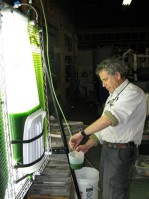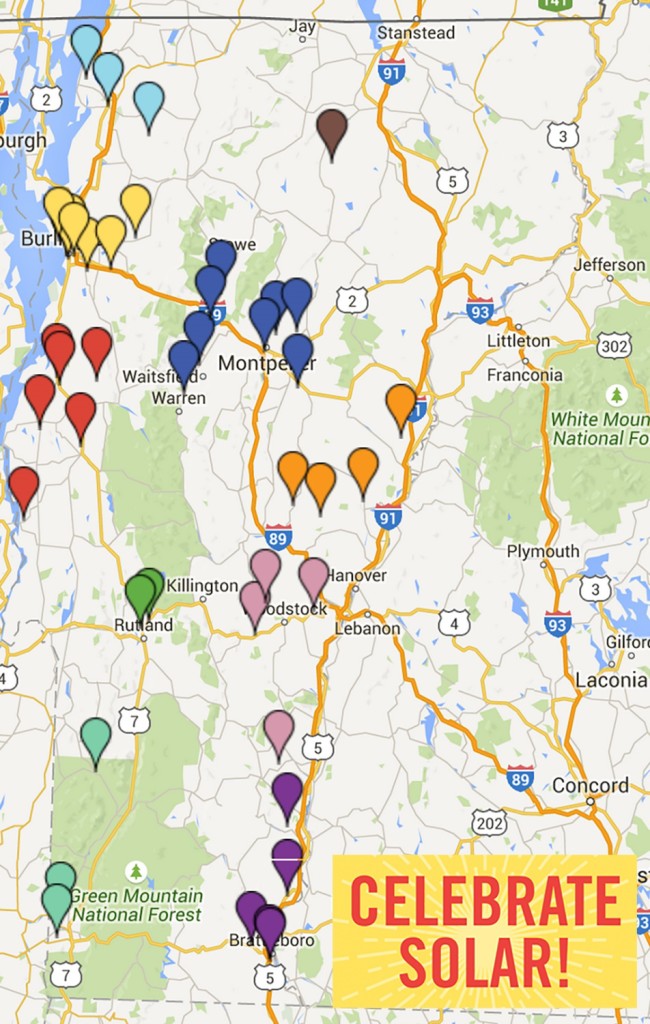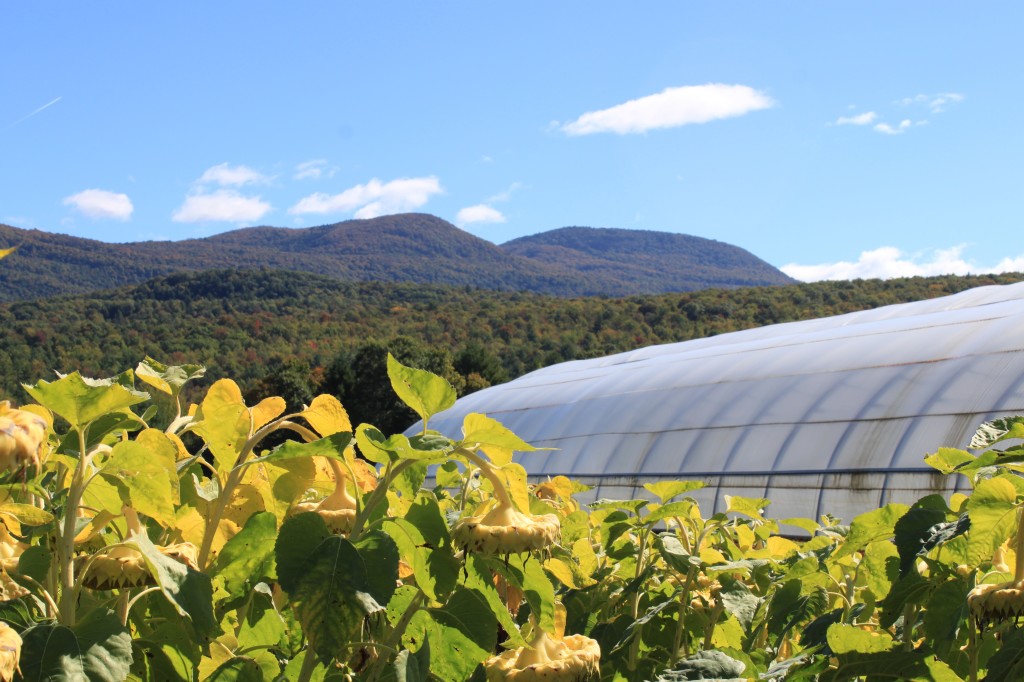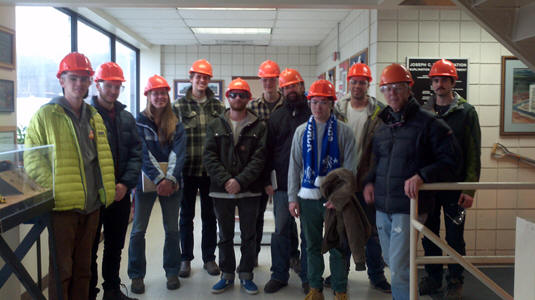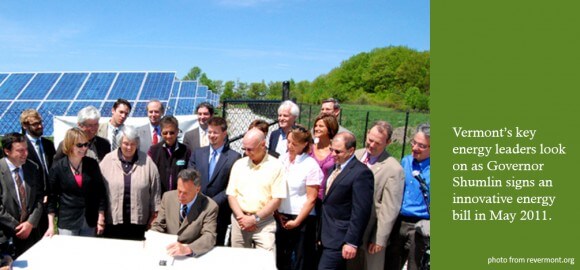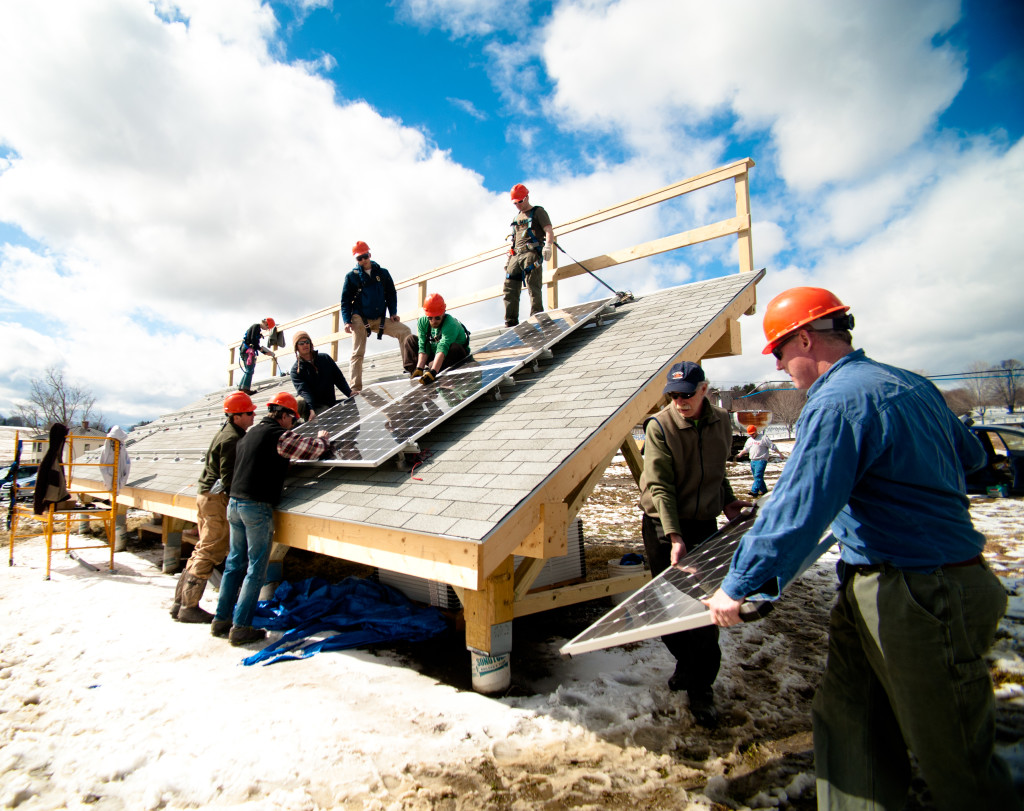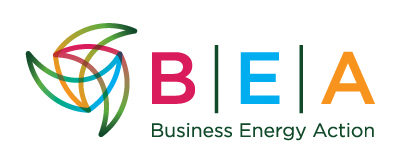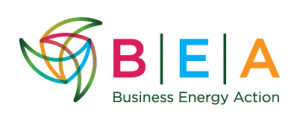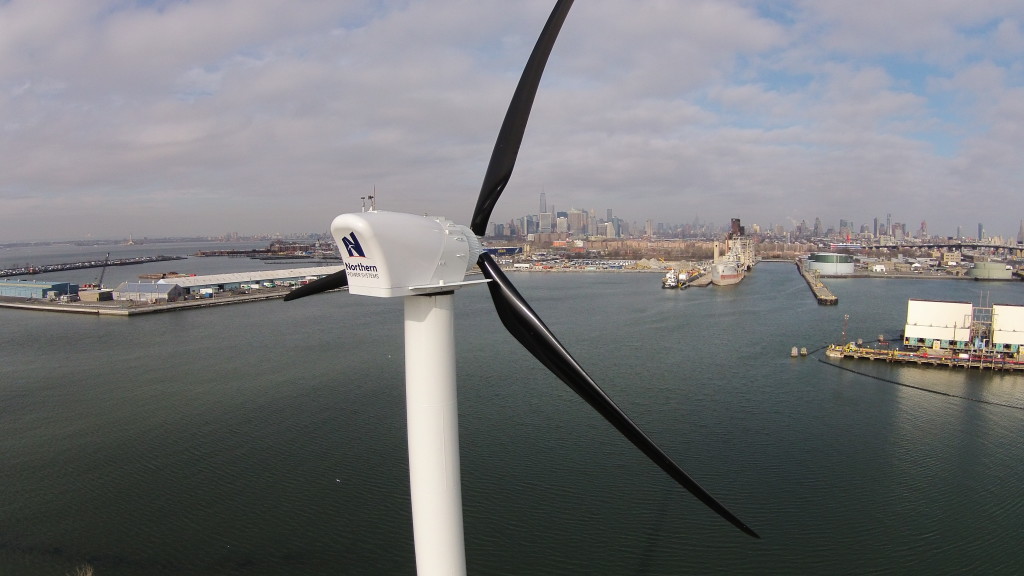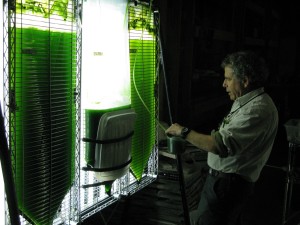 With funding from the US Department of Energy secured by US Senator Patrick Leahy, the Vermont Bioenergy Initiative has supported a number of algae biofuel research projects. This early-stage research and development was undertaken to determine the most viable and cost-effective methods for accessing algae’s commercial potential to produce clean renewable energy while treating wastewater and supplying nutrient-rich feeds and food.
With funding from the US Department of Energy secured by US Senator Patrick Leahy, the Vermont Bioenergy Initiative has supported a number of algae biofuel research projects. This early-stage research and development was undertaken to determine the most viable and cost-effective methods for accessing algae’s commercial potential to produce clean renewable energy while treating wastewater and supplying nutrient-rich feeds and food.
Algae produces more than half of the oxygen on the planet, while consuming vast amounts of heat-trapping carbon dioxide and taking up nutrients like nitrogen and phosphorous to make biomass and energy. The lipids, or oil, that algae produce can be extracted and processed into renewable fuels such as biodiesel. Algae are an excellent source of oil for making biodiesel, which could displace substantial volumes of petro-diesel for heating and transportation. Microalgae reproduce rapidly, and they grow on non-agricultural land, so they do not compete with food, feed, or fiber production.
The keys to commercializing algae for biofuel production include identifying and cultivating native species, optimizing growing conditions in natural and artificial environments and the efficient harvest and oil extraction of algal biomass. At the forefront of this algae biofuel research is Dr. Anju Dahiya, cofounder of General Systems Research, LLC, lead biofuels instructor at the University of Vermont’s Rubenstein School of Environment and Natural Resources, and Vermont Bioenergy algae for biofuel grant recipient. Dr. Dahiya has been searching for high lipid algae strains, and scaling those up to a level that could be available for commercial use, especially for biofuels.
“At GSR Solutions, we are looking at producing algae not just for biofuels, but combining it with waste water treatment and to produce other valued byproducts as well. This is very significant, because this would make algae production cost-effective. This would also help in nutrient recovery,” says Dahiya.
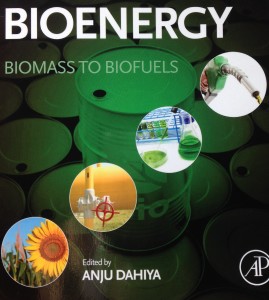
innovative new textbook that provides insight into the potential and current advances and benefits of biofuel
Some of the findings and knowledge afforded by Dr. Dahiya’s research are available in the new introductory textbook, Bioenergy: Biomass to Biofuels, which was edited by Anju Dahiya less than a year ago and represents a compilation of work from an extensive list of well-respected university extension programs, such as The University of Vermont Research Extension, as well as numerous national organizations including the US Department of Energy’s National Renewable Energy Laboratories. Dr. Dahiya will also be using this textbook as the basis for a University of Vermont Bioenergy Course offered for the 2015 fall semester.
In the below video, Vermont researchers and entrepreneurs demonstrate their innovations in algae to biofuel research and development.
For more algae bioenergy resources see the visit the Algae section of the Vermont Bioenergy Website.
Learn more about the mentioned UVM Bioenergy Course visit the University of Vermont Renewable BioEnergy page or email the lead instructor Anju Dahiya at adahiya@uvm.edu.
For more information on the introductory textbook Bioenery; Biomass to Biofuels see our write up on the book here!
Vermont’s solar industry is lauding Governor Peter Shumlin’s proclamation of the third Saturday in June as “Celebrate Solar Day” in Vermont.
The solar proclamation, announced at the Whitcomb Farm in Essex, coincides with this June 20th, when solar projects in communities throughout Vermont will be open for public tours. June 20 is the weekend of the Summer Solstice.
Like open sugarhouse weekend in the spring and open art studio weekend in the fall, the inaugural summertime tours will give Vermonters the opportunity to get an up-close view of solar systems to learn about the technology, solar economics, and the benefits of solar to our community. Solar customers, host farmers, and owners will be on-hand to speak with the public.
More than 50 systems across all regions of the state will be participating in Celebrate Solar Tours and a map of open tours can be found here. Many participating sites will host refreshments, music, or other entertainment. Other planned solar events include community walking tours of residential solar installations, miniature golf, a self-guided bike tour, and on-site yoga.
The Governor’s proclamation notes that “solar energy represented 99% of new electrical capacity in the state in 2014 and more than 5,000 Vermont customers have installed solar” through Vermont’s net metering program.
Further, it cites that the Vermont clean energy industries employ over 15,000 Vermonters, with solar providing “a broad spectrum of employment opportunities, helping retain and attract Vermonters working in manufacturing, installation, and sales, among other careers.”
The Whitcomb family is host to a 2.2 Megawatt solar farm that provides energy for Vermont’s SPEED program.
Among the solar sites open to tour June 20: iconic and sweet Vermont attractions like Cold Hollow Cider and Morse Farm Maple Sugarworks, high-tech attractions like Draker and Small Dog Electronics, agricultural farms like Champlain Orchards, shared community solar arrays, and some of Vermont’s highest producing solar farms.
At the announcement of the solar tours, Paul Brown, owner of Cold Hollow Cider in Waterbury Center, which has a 150kW system powering its operations, said of the event, “Folks know us and visit us for our cider and donuts. But we are thrilled to open up the field behind our cidery to share the benefits of solar technology to our business and our community. We’ll of course also be serving up some sweet treats for those who come by.”
About Celebrate Solar Tours – June 20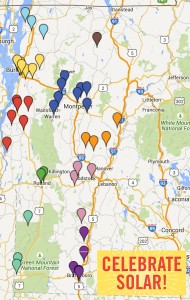
The first annual Celebrate Solar Tours on June 20 will feature public tours of more than 50 solar systems of varying size throughout the state. The public will have the opportunity to get an up-close understanding of the technology, economics and benefits to the community. Open systems will be designated with roadway signage and many will feature music, refreshments or other entertainment.
Contact: Ansley Bloomer
Ansley@revermont.org or 802-595-0723
In order to meet the goals set by Vermont’s comprehensive energy plan for Vermont to produce 90 percent of the state’s energy needs from renewables by 2050 and reduce Vermont’s greenhouse gas emissions by 50 percent from a 1990 baseline, Vermont farmers will have an important role to play. As Vermont experiences growth in food-related businesses and jobs, decisions about energy become more important prompting statewide energy and agriculture collaborations. In the following episodes of Across the Fence, UVM Extension agricultural engineer and Vermont Bioenergy Initiative biofuels consultant, Chris Callahan, shares two stories about Vermont farmers who are rethinking their on-farm energy. In both examples UVM extension is able to work with the farmers to help make cleaner, renewable on-farm energy sources a practical solution that saves money and results in greenhouse gas reductions.
Learn more in a series of on-farm energy case studies produced by Vermont’s Farm to Plate Initiative.
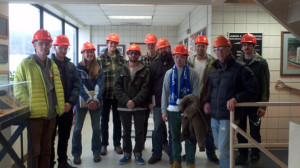 Coming this fall the University of Vermont will be offering a bioenergy course taught by Anju Dahiya, cofounder of General Systems Research, LLC, lead biofuels instructor at the University of Vermont’s Rubenstein School of Environment and Natural Resources, and Vermont Bioenergy algae for biofuel grant recipient. This course is open to both degree and non-degree students from any background or department, as well as farmers, entrepreneurs, and teachers interested in developing curriculum, or projects at school or college levels. This course is also approved for graduate credit.
Coming this fall the University of Vermont will be offering a bioenergy course taught by Anju Dahiya, cofounder of General Systems Research, LLC, lead biofuels instructor at the University of Vermont’s Rubenstein School of Environment and Natural Resources, and Vermont Bioenergy algae for biofuel grant recipient. This course is open to both degree and non-degree students from any background or department, as well as farmers, entrepreneurs, and teachers interested in developing curriculum, or projects at school or college levels. This course is also approved for graduate credit.
Potential participants are offered the option of variable credits, ranging from 0 to 6 credit hours. This allows prospective students to only attend lectures and have access to online course materials for 2 credits; further their experience with the addition of hands-on labs and field trips for 3 credits; or participate in all aspects of the class while additionally applying lessons to a service learning project with a community partner, earning 4 credits. Participants have the ability to add up to 2 more credits, totaling no more than 6, for additional work with the community partner pending special permission from the course instructor.
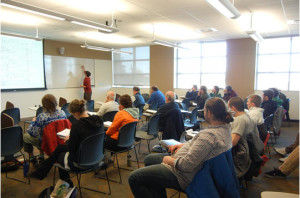 Lectures will be held twice a week between September 18th and December 9th of 2015. Friday lectures will be on campus from 4:05 pm to 7:05 pm, followed by Saturday morning field trips between 10:00 am and 1:00 pm for those students who elected for 3 credits or more. The course required textbook, Bioenergy: Biomass to Biofuels, was edited by Anju Dahiya less than a year ago and represents a compilation of work from an extensive list of well-respected university extension programs, such as The University of Vermont Research Extension, as well as numerous national organizations including the US Department of Energy’s National Renewable Energy Laboratories.
Lectures will be held twice a week between September 18th and December 9th of 2015. Friday lectures will be on campus from 4:05 pm to 7:05 pm, followed by Saturday morning field trips between 10:00 am and 1:00 pm for those students who elected for 3 credits or more. The course required textbook, Bioenergy: Biomass to Biofuels, was edited by Anju Dahiya less than a year ago and represents a compilation of work from an extensive list of well-respected university extension programs, such as The University of Vermont Research Extension, as well as numerous national organizations including the US Department of Energy’s National Renewable Energy Laboratories.
Learn more about this course at the University of Vermont Renewable BioEnergy page or email the lead instructor Anju Dahiya at adahiya@uvm.edu.
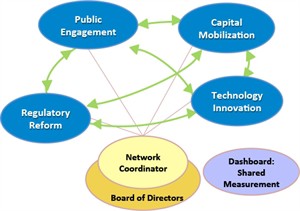
The EAN’s 4 Key Leverage Points of capital mobilization, public engagement, technology innovation, and regulatory reform
The Energy Action Network (EAN) is a community of a community of Green Mountain State stakeholders working to change the Vermont energy landscape “to end Vermont’s reliance on fossil fuels and to create clean, affordable energy and secure electric, heating, and transportation systems for the 21st century.” Their goals are consistent with the State of Vermont 2011 Comprehensive Energy Plan, which aims to meet 90% of Vermont’s energy needs through efficiency and renewable sources by 2050.
EAN has identified a series of pathways for Vermont for Vermont to accomplish the paradigm shift of 90% renewables by 2050. Membership is structured into working groups focused on four “leverage points” capital mobilization, public engagement, technology innovation, and regulatory reform. Current projects include alterations to Act 250, changes in zoning laws, programs to promote bringing rental properties into efficiency standards, and assessing current land use for its potential for bioenergy and solar projects.
One notable awareness vehicle, Brighter Vermont, encourages Vermonters to change the way common energy use and think more about where energy comes from. Read more about how Brighter Vermont helps change energy behavior. EAN also works with municipalities and recently helped Montpelier plan for a 15 year track to become the first state capital to accomplish all of its energy needs with renewable energy. On February 12, 2015 the Montpelier City council accepted and endorsed the plan to make Montpelier a “net zero” city.
Currently, EAN is working with the Vermont Sustainable Jobs Fund to expand the Vermont Energy Atlas website into the Community Energy Dashboard. The Dashboard will enable communities to understand their energy use and make clean energy choices and investments across all energy sectors—heating, transportation, and electricity. The Dashboard will make energy use visible and understandable to consumers and communities by showing town-level progress toward Vermont’s 90% renewables by 2050 goal. The Dashboard will also shows existing and potential renewable energy sites (solar, wind, hydro, biomass). We will provide updates as they develop. Stay tuned into the Vermont Bioenergy Field Notes blog and visit the Energy Action Network website to learn more.
Vermontivate launches fun challenge for building hope and community sustainability
Vermontivate, an on-line/real-world game, brings fun and creativity to the serious and important work of tackling climate change. Players from around the state will spend six weeks from March 23 – May 2, 2015 racking up points on a wide range of challenges ranging from installing energy efficient light bulbs and starting composting piles to establishing community solar CSAs, test driving electric vehicles, and inventing hybrid modes of transportation.
“Climate change is one of the most significant issues we face as a society,” says Vermontivate co-founder Kathryn Blume, “and most people don’t know what they can do to make a difference. Vermontivate is an entertaining, educational, and competitive way of taking meaningful action and building strong communities. Plus, we celebrate the end of the game with a Ben & Jerry’s ice cream party on the State House lawn in May. Climate action doesn’t get much better than that!”
From global warming newbies to well-educated sustainability mavens, people of all ages and experience levels are invited to play. People who don’t live in Vermont can also register to play on behalf of their favorite Vermont team.
The game, now in its fourth year, has kicked it up for 2015. Thanks to increased funding from a wide range of donors, foundations, and state agencies, they’ve built an entirely new website that looks like a quirky, old-fashioned board game. Challenges have been created to align with
Vermont’s highest-level climate goals, and are designed for maximum real world impact. The game will also feature a video contest, team challenges, and the chance to win a wide range of prizes including gift certificates from local restaurants and free pints of ice cream.
“There are a lot of great energy saving games out there,” says Blume, “but Vermontivate is one of the few gamification strategies that tackles full spectrum sustainability. The core challenges are around energy, transportation and food, but we also play with everything from waste reduction and water conservation to Gross National Happiness and the sharing economy.”
“We have something for everyone,” says game co-founder and Vermont Energy Investment Corporation consultant Nick Lange. “As we say to our players: Play Well, Do Good, Be Great!”
For more information and to get on the registration mailing list, visit vermontivate.com
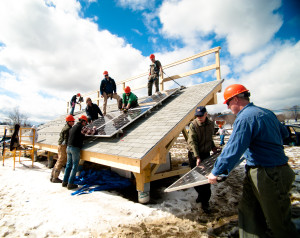 Vermont Technical College is committed to educating students as the workforce to support renewable energy systems and infrastructure development in Vermont. A number of technical “green trainings” are being offered in the coming months ranging from solar PV, solar hot water, waste water, OSHA standards, and wetland delineation.
Vermont Technical College is committed to educating students as the workforce to support renewable energy systems and infrastructure development in Vermont. A number of technical “green trainings” are being offered in the coming months ranging from solar PV, solar hot water, waste water, OSHA standards, and wetland delineation.
Vermont Tech is offering introductory and advanced classes that serve as a great opportunity for individuals to enter the growing field of solar installation and for the existing workforce to advance their skill set. By successfully passing the NABCEP Entry Level exam, students at an introductory level will demonstrate the basic knowledge necessary to apply the fundamental application principles, design installation, and operation of grid-tied and stand-alone PV Systems. Renewable Energy Vermont (REV) recently approved this 40-hour training to qualify any individual for Provisional Partnership, regardless of their status of an electrical license.
For the more advanced PV installer, an upcoming one day course on April 15th will provide continuing education for the Electrical S license in solar technology. Taught by Dan Kiney, in compliance with the Vermont State Electrical Board, this class has been approved by the VT State Electrical Board for 8 S License Continuing Education Hours.
The 16 hour Introduction to Solar Hot Water being held May 2-3 has been approved for licensed plumbers by REV for Provisional Solar Hot Water Partnership and only requires a basic knowledge of electrical systems.
Additionally, a BPI Dual Certificate Training scheduled for June 1-5 will focus on the building sciences related to physics and control strategies for air, heat, and moisture and will prepare students to test for their Building Analyst and Envelope Professional Certifications.
Learn more about these and other Vermont Tech Continuing Education & Workforce Development Green Trainings.
Burlington, VT, March 16, 2015– Vermont Businesses for Social Responsibility (VBSR)
announced that it secured funding to continue the Business Energy Action (BEA) program through 2015. BEA works with companies to help them implement energy efficiency strategies that help to save 5% per year.
This additional funding for BEA is provided by the Vermont Bioenergy Initiative, a program of the Vermont Sustainable Jobs Fund. The Vermont Bioenergy Initiative connects diversified agriculture and local renewable energy production for on-farm and community use by supporting research, technical assistance, and infrastructure development in emerging areas of bioenergy, and overall education on the benefits of renewable energy and energy efficiency. Funding was made possible by the Office of US Senator Patrick Leahy and the US Department of Energy.
“We’re grateful for the support of Vermont Sustainable Jobs Fund as we work to help Vermont businesses reduce their need for fossil fuel,” said Andrea Cohen, Executive Director of Vermont Businesses for Social Responsibility. “Business Energy Action helps businesses be not only more responsible consumers of energy, but also helps their bottom line to create a more vibrant economy here in Vermont.”
Business Energy Action is currently working with more than 80 member businesses across the state.
About VBSR
Founded in 1990, VBSR is a statewide, non-profit business association with a mission to advance business ethics that value multiple bottom lines: economic, social, and environmental. Through education, public influence, and workplace quality, VBSR strives to help 760+ members set a high standard for protecting the natural, human, and economic environments of the state’s residents, while remaining profitable. Learn more or join the cause at www.vbsr.org.

Aegis Renewable Energy a Vermont based renewable energy company designed and installed the first commercial wind turbine in New York City at “Sunset Park” SIMS Municipal Recycling plant in Brooklyn. Aegis erected the 100kW wind turbine in December, 2014 and partnered with Vermont based wind turbine manufacturer, Northern Power Systems located in Barre, Vermont.
The project was recently featured in the New York Times: “In less than a month of operation, the first large-scale wind turbine to be installed in New York City, standing more than 160 feet tall, has produced enough energy to power two homes for over a year, or one 20-watt light bulb for over a century.”
The energy produced from the wind turbine “is expected to provide 4 percent of the energy used by the plant,” the Times article continues. Aegis’ CEO, Nils Behn, was also quoted in the article: “The Sunset Park waterfront’s wide-open nature makes it a prime spot for harvesting wind.”
Aegis won the project through a competitive bid process in 2011 and immediately began the electrical and foundation design process as well as completing various studies including sound and wildlife impact analyses, all of which were critical components in securing grants and permitting for the project.
Aegis has partnered with Northern Power Systems on 15 projects to date, “Northern’s undisputed position as the world leader in the 100kW wind turbine market, and their uncompromising commitment to quality, has been a key component to our success and theirs” said Nils Behn, CEO of Aegis.
During the ribbon cutting ceremony in New York, Northern Power CEO Troy Patton said “Northern Power leverages knowledge from over 400 wind turbine projects around the world to provide installers with training on the best practices for smooth and efficient installations”.
Aegis partners with other Vermont companies, including Green Mountain Credit Union which partnered with Aegis to create a community solar loan program, and the Vermont Sustainable Jobs Fund (VSJF)- Flexible Capital Fund which provided growth stage royalty financing to help Aegis expand its business operation and create more jobs in Vermont’s renewable energy sector.
About Aegis Renewable Energy
Aegis Renewable Energy offers full-service community-scale renewable energy solutions for farms, businesses, non-profits, and municipalities. Wind, Solar and Anaerobic digesters (cow manure and food waste) are included in Aegis’ services designed to help clients save money and the planet. Aegis Renewable Energy is located in Waitsfield, Vermont and provides cost evaluation, permitting, and financing support, installation, and maintenance services throughout Vermont and New England. To learn more about Aegis Renewable Energy, please visit www.aegis-re.com.
About Northern Power Systems
Northern Power Systems designs, manufactures, and sells wind turbines and power technology products, and provides engineering development services and technology licenses for energy applications, into the global marketplace from its US headquarters and European offices. Northern Power Systems has almost 40 years’ experience in technologies and products generating renewable energy. Northern Power Systems currently manufactures the NPS™ 60 and NPS™ 100 turbines. With over 6 million run time hours across its global fleet, Northern Power wind turbines provide customers with clean, cost effective, reliable renewable energy. To learn more about Northern Power Systems, please visit www.northernpower.com.
If you would like more information about this topic, please contact: Sonia Behn 802-496- 5155 or email at sbehn@aegis-re.com.
16 Feb 2015
Upcoming Farm Energy IQ Training

It’s not too late to register for the upcoming Farm Energy IQ Training for New England Agricultural Service Providers. This training will take place starting Monday, February 23rd at 8:00 a.m. and will end Wednesday February 25 in Fairlee, Vermont. Organized by individuals from the University of Vermont Extension Service, Penn State, and Rutgers University, this three day training is a great opportunity for those interested in on farm energy to learn and apply their skills as well as network with other attendees. The Farm IQ Energy Training is funded generously by Northeast Sustainable Agriculture Research and Education (SARE) Program as part of a regional professional development program to bring the latest developments in the field to individuals who can best apply them.
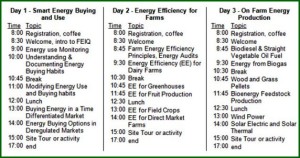
This conference will provide a range of opportunities to learn or improve energy purchasing, calculating, conservation, production, and analysis.Attendees will even have the opportunity to apply skills via hands-on activities and by visiting local operations. Over the three days these lessons will be compared for application on farms in different settings. In addition, attendees will receive a comprehensive binder with all the material covered in the workshops as well as supplemental materials to refresh and share material as well as continue learning.
This conference is a great opportunity to solidify one’s knowledge by learning from on hand specialist and being immersed with in the material. If you happen to miss this particular training, the same workshop will be offered in Pennsylvania, March 10th to the 12th and again in New Jersey from April 8th to the 10th.
Read more about renewable energy events around the country on the Vermont Bioenergy Field Notes blog




